Yunfei Zhao
refer to the report for detailed contributions
HY3D-Bench: Generation of 3D Assets
Feb 03, 2026Abstract:While recent advances in neural representations and generative models have revolutionized 3D content creation, the field remains constrained by significant data processing bottlenecks. To address this, we introduce HY3D-Bench, an open-source ecosystem designed to establish a unified, high-quality foundation for 3D generation. Our contributions are threefold: (1) We curate a library of 250k high-fidelity 3D objects distilled from large-scale repositories, employing a rigorous pipeline to deliver training-ready artifacts, including watertight meshes and multi-view renderings; (2) We introduce structured part-level decomposition, providing the granularity essential for fine-grained perception and controllable editing; and (3) We bridge real-world distribution gaps via a scalable AIGC synthesis pipeline, contributing 125k synthetic assets to enhance diversity in long-tail categories. Validated empirically through the training of Hunyuan3D-2.1-Small, HY3D-Bench democratizes access to robust data resources, aiming to catalyze innovation across 3D perception, robotics, and digital content creation.
SIN-Bench: Tracing Native Evidence Chains in Long-Context Multimodal Scientific Interleaved Literature
Jan 15, 2026Abstract:Evaluating whether multimodal large language models truly understand long-form scientific papers remains challenging: answer-only metrics and synthetic "Needle-In-A-Haystack" tests often reward answer matching without requiring a causal, evidence-linked reasoning trace in the document. We propose the "Fish-in-the-Ocean" (FITO) paradigm, which requires models to construct explicit cross-modal evidence chains within native scientific documents. To operationalize FITO, we build SIN-Data, a scientific interleaved corpus that preserves the native interleaving of text and figures. On top of it, we construct SIN-Bench with four progressive tasks covering evidence discovery (SIN-Find), hypothesis verification (SIN-Verify), grounded QA (SIN-QA), and evidence-anchored synthesis (SIN-Summary). We further introduce "No Evidence, No Score", scoring predictions when grounded to verifiable anchors and diagnosing evidence quality via matching, relevance, and logic. Experiments on eight MLLMs show that grounding is the primary bottleneck: Gemini-3-pro achieves the best average overall score (0.573), while GPT-5 attains the highest SIN-QA answer accuracy (0.767) but underperforms on evidence-aligned overall scores, exposing a gap between correctness and traceable support.
NL2Repo-Bench: Towards Long-Horizon Repository Generation Evaluation of Coding Agents
Dec 14, 2025Abstract:Recent advances in coding agents suggest rapid progress toward autonomous software development, yet existing benchmarks fail to rigorously evaluate the long-horizon capabilities required to build complete software systems. Most prior evaluations focus on localized code generation, scaffolded completion, or short-term repair tasks, leaving open the question of whether agents can sustain coherent reasoning, planning, and execution over the extended horizons demanded by real-world repository construction. To address this gap, we present NL2Repo Bench, a benchmark explicitly designed to evaluate the long-horizon repository generation ability of coding agents. Given only a single natural-language requirements document and an empty workspace, agents must autonomously design the architecture, manage dependencies, implement multi-module logic, and produce a fully installable Python library. Our experiments across state-of-the-art open- and closed-source models reveal that long-horizon repository generation remains largely unsolved: even the strongest agents achieve below 40% average test pass rates and rarely complete an entire repository correctly. Detailed analysis uncovers fundamental long-horizon failure modes, including premature termination, loss of global coherence, fragile cross-file dependencies, and inadequate planning over hundreds of interaction steps. NL2Repo Bench establishes a rigorous, verifiable testbed for measuring sustained agentic competence and highlights long-horizon reasoning as a central bottleneck for the next generation of autonomous coding agents.
Hunyuan3D Studio: End-to-End AI Pipeline for Game-Ready 3D Asset Generation
Sep 16, 2025



Abstract:The creation of high-quality 3D assets, a cornerstone of modern game development, has long been characterized by labor-intensive and specialized workflows. This paper presents Hunyuan3D Studio, an end-to-end AI-powered content creation platform designed to revolutionize the game production pipeline by automating and streamlining the generation of game-ready 3D assets. At its core, Hunyuan3D Studio integrates a suite of advanced neural modules (such as Part-level 3D Generation, Polygon Generation, Semantic UV, etc.) into a cohesive and user-friendly system. This unified framework allows for the rapid transformation of a single concept image or textual description into a fully-realized, production-quality 3D model complete with optimized geometry and high-fidelity PBR textures. We demonstrate that assets generated by Hunyuan3D Studio are not only visually compelling but also adhere to the stringent technical requirements of contemporary game engines, significantly reducing iteration time and lowering the barrier to entry for 3D content creation. By providing a seamless bridge from creative intent to technical asset, Hunyuan3D Studio represents a significant leap forward for AI-assisted workflows in game development and interactive media.
X-Part: high fidelity and structure coherent shape decomposition
Sep 10, 2025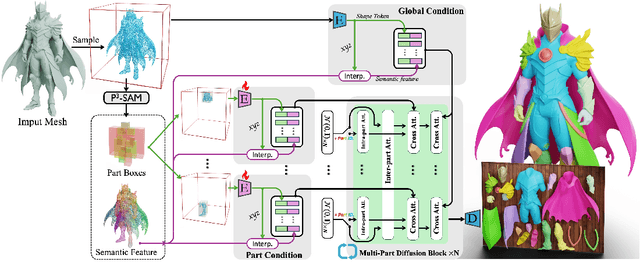
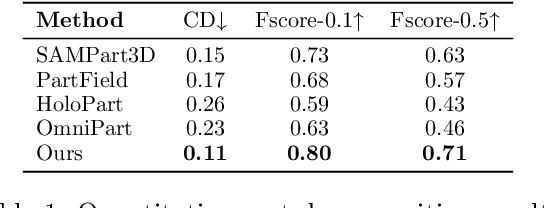
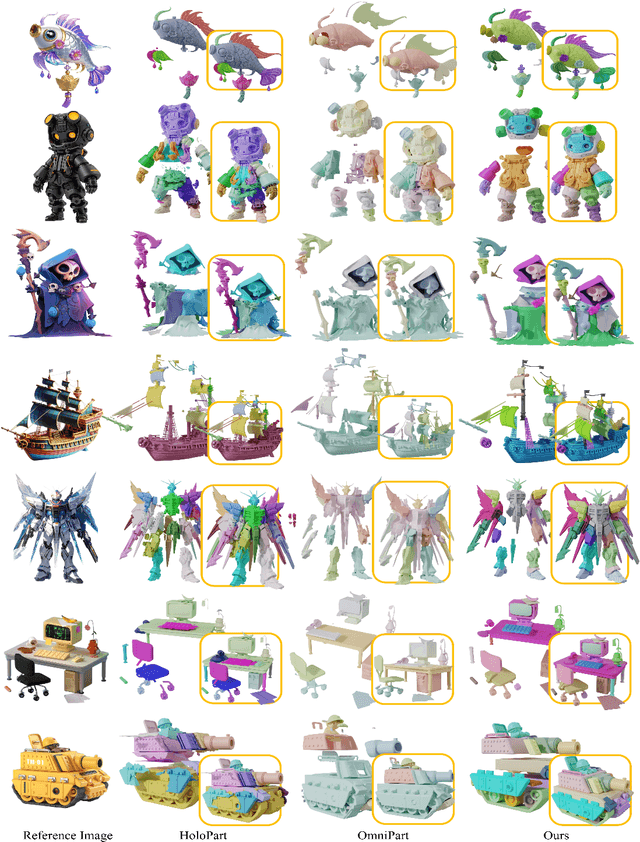
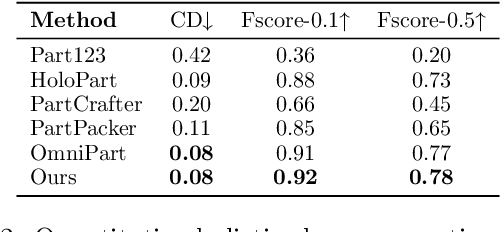
Abstract:Generating 3D shapes at part level is pivotal for downstream applications such as mesh retopology, UV mapping, and 3D printing. However, existing part-based generation methods often lack sufficient controllability and suffer from poor semantically meaningful decomposition. To this end, we introduce X-Part, a controllable generative model designed to decompose a holistic 3D object into semantically meaningful and structurally coherent parts with high geometric fidelity. X-Part exploits the bounding box as prompts for the part generation and injects point-wise semantic features for meaningful decomposition. Furthermore, we design an editable pipeline for interactive part generation. Extensive experimental results show that X-Part achieves state-of-the-art performance in part-level shape generation. This work establishes a new paradigm for creating production-ready, editable, and structurally sound 3D assets. Codes will be released for public research.
Hunyuan3D 2.1: From Images to High-Fidelity 3D Assets with Production-Ready PBR Material
Jun 18, 2025Abstract:3D AI-generated content (AIGC) is a passionate field that has significantly accelerated the creation of 3D models in gaming, film, and design. Despite the development of several groundbreaking models that have revolutionized 3D generation, the field remains largely accessible only to researchers, developers, and designers due to the complexities involved in collecting, processing, and training 3D models. To address these challenges, we introduce Hunyuan3D 2.1 as a case study in this tutorial. This tutorial offers a comprehensive, step-by-step guide on processing 3D data, training a 3D generative model, and evaluating its performance using Hunyuan3D 2.1, an advanced system for producing high-resolution, textured 3D assets. The system comprises two core components: the Hunyuan3D-DiT for shape generation and the Hunyuan3D-Paint for texture synthesis. We will explore the entire workflow, including data preparation, model architecture, training strategies, evaluation metrics, and deployment. By the conclusion of this tutorial, you will have the knowledge to finetune or develop a robust 3D generative model suitable for applications in gaming, virtual reality, and industrial design.
Unleashing Vecset Diffusion Model for Fast Shape Generation
Mar 20, 2025Abstract:3D shape generation has greatly flourished through the development of so-called "native" 3D diffusion, particularly through the Vecset Diffusion Model (VDM). While recent advancements have shown promising results in generating high-resolution 3D shapes, VDM still struggles with high-speed generation. Challenges exist because of difficulties not only in accelerating diffusion sampling but also VAE decoding in VDM, areas under-explored in previous works. To address these challenges, we present FlashVDM, a systematic framework for accelerating both VAE and DiT in VDM. For DiT, FlashVDM enables flexible diffusion sampling with as few as 5 inference steps and comparable quality, which is made possible by stabilizing consistency distillation with our newly introduced Progressive Flow Distillation. For VAE, we introduce a lightning vecset decoder equipped with Adaptive KV Selection, Hierarchical Volume Decoding, and Efficient Network Design. By exploiting the locality of the vecset and the sparsity of shape surface in the volume, our decoder drastically lowers FLOPs, minimizing the overall decoding overhead. We apply FlashVDM to Hunyuan3D-2 to obtain Hunyuan3D-2 Turbo. Through systematic evaluation, we show that our model significantly outperforms existing fast 3D generation methods, achieving comparable performance to the state-of-the-art while reducing inference time by over 45x for reconstruction and 32x for generation. Code and models are available at https://github.com/Tencent/FlashVDM.
Hunyuan3D 2.0: Scaling Diffusion Models for High Resolution Textured 3D Assets Generation
Jan 21, 2025



Abstract:We present Hunyuan3D 2.0, an advanced large-scale 3D synthesis system for generating high-resolution textured 3D assets. This system includes two foundation components: a large-scale shape generation model -- Hunyuan3D-DiT, and a large-scale texture synthesis model -- Hunyuan3D-Paint. The shape generative model, built on a scalable flow-based diffusion transformer, aims to create geometry that properly aligns with a given condition image, laying a solid foundation for downstream applications. The texture synthesis model, benefiting from strong geometric and diffusion priors, produces high-resolution and vibrant texture maps for either generated or hand-crafted meshes. Furthermore, we build Hunyuan3D-Studio -- a versatile, user-friendly production platform that simplifies the re-creation process of 3D assets. It allows both professional and amateur users to manipulate or even animate their meshes efficiently. We systematically evaluate our models, showing that Hunyuan3D 2.0 outperforms previous state-of-the-art models, including the open-source models and closed-source models in geometry details, condition alignment, texture quality, and etc. Hunyuan3D 2.0 is publicly released in order to fill the gaps in the open-source 3D community for large-scale foundation generative models. The code and pre-trained weights of our models are available at: https://github.com/Tencent/Hunyuan3D-2
DevEval: A Manually-Annotated Code Generation Benchmark Aligned with Real-World Code Repositories
May 30, 2024Abstract:How to evaluate the coding abilities of Large Language Models (LLMs) remains an open question. We find that existing benchmarks are poorly aligned with real-world code repositories and are insufficient to evaluate the coding abilities of LLMs. To address the knowledge gap, we propose a new benchmark named DevEval, which has three advances. (1) DevEval aligns with real-world repositories in multiple dimensions, e.g., code distributions and dependency distributions. (2) DevEval is annotated by 13 developers and contains comprehensive annotations (e.g., requirements, original repositories, reference code, and reference dependencies). (3) DevEval comprises 1,874 testing samples from 117 repositories, covering 10 popular domains (e.g., Internet, Database). Based on DevEval, we propose repository-level code generation and evaluate 8 popular LLMs on DevEval (e.g., gpt-4, gpt-3.5, StarCoder 2, DeepSeek Coder, CodeLLaMa). Our experiments reveal these LLMs' coding abilities in real-world code repositories. For example, in our experiments, the highest Pass@1 of gpt-4-turbo is only 53.04%. We also analyze LLMs' failed cases and summarize their shortcomings. We hope DevEval can facilitate the development of LLMs in real code repositories. DevEval, prompts, and LLMs' predictions have been released.
DevEval: Evaluating Code Generation in Practical Software Projects
Jan 26, 2024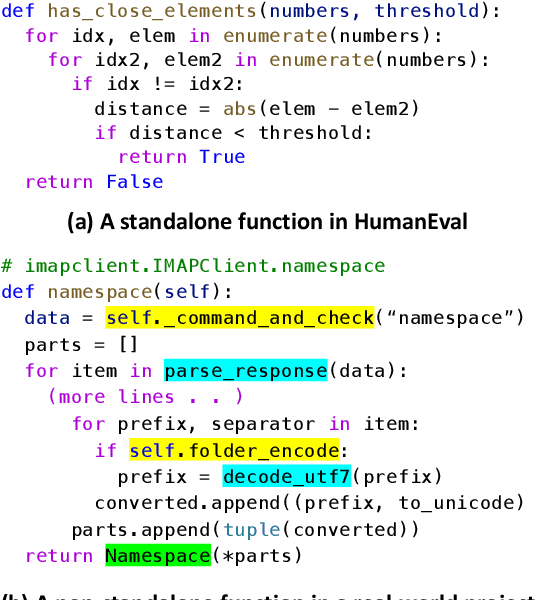

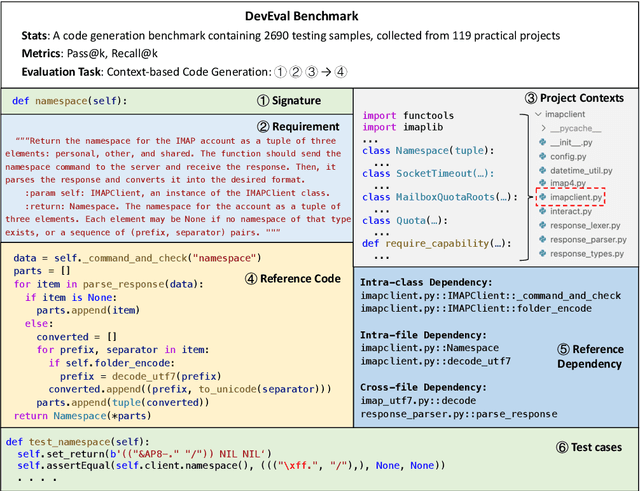

Abstract:How to evaluate Large Language Models (LLMs) in code generation is an open question. Many benchmarks have been proposed but are inconsistent with practical software projects, e.g., unreal program distributions, insufficient dependencies, and small-scale project contexts. Thus, the capabilities of LLMs in practical projects are still unclear. In this paper, we propose a new benchmark named DevEval, aligned with Developers' experiences in practical projects. DevEval is collected through a rigorous pipeline, containing 2,690 samples from 119 practical projects and covering 10 domains. Compared to previous benchmarks, DevEval aligns to practical projects in multiple dimensions, e.g., real program distributions, sufficient dependencies, and enough-scale project contexts. We assess five popular LLMs on DevEval (e.g., gpt-4, gpt-3.5-turbo, CodeLLaMa, and StarCoder) and reveal their actual abilities in code generation. For instance, the highest Pass@1 of gpt-3.5-turbo only is 42 in our experiments. We also discuss the challenges and future directions of code generation in practical projects. We open-source DevEval and hope it can facilitate the development of code generation in practical projects.
 Add to Chrome
Add to Chrome Add to Firefox
Add to Firefox Add to Edge
Add to Edge